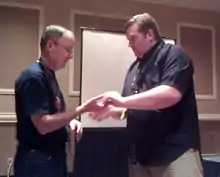Christopher J. Hadnagy
Christopher James Hadnagy is an American author and information technology security consultant.
Christopher J. Hadnagy | |
|---|---|
 General Keith Alexander (left) offers Chris Hadnagy the NSA Director's Challenge Coin at DEF CON 20. | |
| Born | Christopher James Hadnagy |
| Occupation(s) | Information technology consultant, author |
| Organization(s) | Innocent Lives Foundation, Social-Engineer, LLC |
| Website | www |
Career
Hadnagy is the founder and CEO of Social-Engineer LLC,[1] a company that provides education and training related to social engineering.[2] He is a founder of Social-Engineer.Org,[3] an IT security education website, and Innocent Lives Foundation, an organization that aims to identify people involved in child trafficking.[4]
Hadnagy is also an adjunct professor at the University of Arizona's Center of Academic Excellence in Cyber Operations.[5]
DEF CON
In February 2022, Hadnagy was banned permanently from hacker conference DEF CON, where he operated a colocated event ("village"), for unspecified code of conduct violations,[2] as announced in the organization's transparency report: "We received multiple CoC violation reports about a DEF CON Village leader, Chris Hadnagy of the SE Village. After conversations with the reporting parties and Chris, we are confident the severity of the transgressions merits a ban from DEF CON."[6]
In Hadnagy's response on his blog, he said that he disagrees with the ban, that he had not been informed of the details of any allegations by DEF CON representatives, and that a person affiliated with DEF CON told him they were not related to sexual misconduct.[7] In August 2022, he sued DEF CON for harm to his reputation.[8] Other people in the information security field were concerned that this lawsuit was an effort to expose information about the people who reported the code of conduct violations.[9] The lawsuit was dismissed in January 2023 for lack of personal jurisdiction.[10]
BSides Cleveland
In fall of 2021, BSides Cleveland included Hadnagy on the agenda of speakers for its June 2022 event.[11] Leading up to the event, the organizer labeled Hadnagy's speaking slot as "special guest" instead of listing his name,[12] so attendees and other speakers did not know he would be speaking.[2] His talk was about cancel culture, which he had also presented at a different BSides event last year.[12] After Hadnagy gave his presentation, several other speakers pulled out of the event, and attendees and other people in the information security community criticized the event for hiding his name.[2][12] Some said that they would not have attended the event if they had known he would be a speaker.[2]
Books
In 2018, Ben Rothke and Bill Varhol positively reviewed Social Engineering: The Science of Human Hacking.[13][14] Rothke also reviewed "Unmasking the Social Engineer: The Human Element of Security.[15] Maria Patricia Prandini from Isaca Journal Book Reviews reviewed Phishing Dark Waters: The Offensive and Defensive Sides of Malicious E-mails.[16]
Publications
- Human Hacking: Win Friends, Influence People, and Leave Them Better Off for Having Met You, Christopher Hadnagy, Seth Schulman, 2021, Harper Business (ISBN 978-0-063-00178-7)[17]
- Social Engineering: The Science of Human Hacking, Christopher Hadnagy, 2018, John Wiley & Sons Inc. (ISBN 978-1-119-43338-5)[18]
- Phishing Dark Waters: The Offensive and Defensive Sides of Malicious, by Christopher Hadnagy, Michele Fincher and Robin Dreeke, 2015, John Wiley & Sons Inc. (ISBN 978-1-118-95847-6)
- Unmasking the Social Engineer: The Human Element of Security, Christopher Hadnagy, 2014, John Wiley & Sons, Inc. (ISBN 978-1-118-60857-9)
- Social Engineering: The Art of Human Hacking, Christopher Hadnagy, 2010, Wiley Publishing, Inc. (ISBN 978-0-470-63953-5)
References
- "Hacking humans: social engineering and the power of influence". ABC Radio National. March 16, 2022. Retrieved June 23, 2022.
- Nichols, Shaun (February 10, 2022). "DEF CON bans social engineering expert Chris Hadnagy". TechTarget. Retrieved May 4, 2022.
- Goodchild, Joan (October 17, 2011). "New social engineering poll reveals which scam works better". CSO Online. Retrieved June 23, 2022.
- Larson, Selena (August 14, 2017). "Hacker creates organization to unmask child predators". CNNMoney. Retrieved June 23, 2022.
- "Faculty". The University of Arizona – Center of Academic Excellence.
- "Post DEF CON 29". DEFCON Transparency Report. Retrieved February 10, 2022.
- "Chris Hadnagy's Official Statement". Security Through Education. February 25, 2022.
- Hetzner, Christiaan (August 19, 2022). "Star social engineer dubbed the 'human hacker' sues Def Con after receiving permanent ban". Fortune. Retrieved January 14, 2023.
- Faife, Corin (August 18, 2022). "Def Con banned a social engineering star — now he's suing". The Verge. Retrieved January 14, 2023.
- Wright, Rob (January 16, 2023). "Judge dismisses Chris Hadnagy lawsuit against DEF CON". TechTarget. Retrieved August 23, 2023.
- BSides, Security (June 20, 2022). "Security BSides Response to the BSides Cleveland Incident". Security Bsides. Retrieved June 23, 2022.
- "Security BSides commits to greater conference diversity after speaker backlash". IT PRO. Retrieved June 21, 2022.
- "Bens Book of the Month Review of Social Engineering The Science of Human Hacking". RSA Conference. August 31, 2018. Archived from the original on October 25, 2020. Retrieved January 22, 2020.
- "Book Review: Social Engineering: The Science of Human Hacking". The Ethical Hacker Network. July 26, 2018. Archived from the original on June 20, 2021. Retrieved January 22, 2020.
- "The Cybersecurity Canon: Unmasking the Social Engineer: The Human Element of Security". Palo Alto Networks Blog. September 16, 2016. Retrieved June 23, 2022.
- Hadnagy, Christopher; Fincher, Michele (January 22, 2020). "Phishing Dark Waters: The Offensive and Defensive Sides of Malicious E-mails". ISACA. Archived from the original on July 17, 2017. Retrieved January 22, 2020.
- Human hacking : win friends, influence people, and leave them better off for having met you. OCLC 1255930084. Retrieved June 24, 2021 – via WorldCat.org.
- Hadnagy, Christopher (July 31, 2018). Social Engineering: The Science of Human Hacking. John Wiley & Sons. ISBN 978-1-119-43338-5.